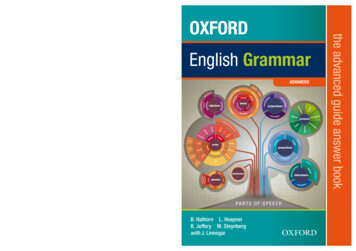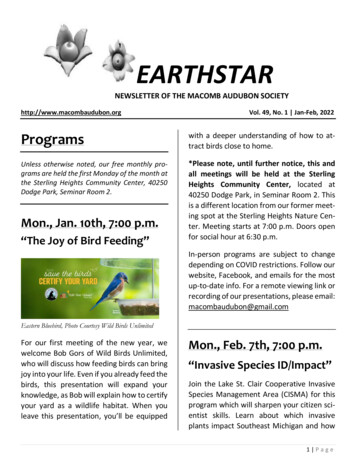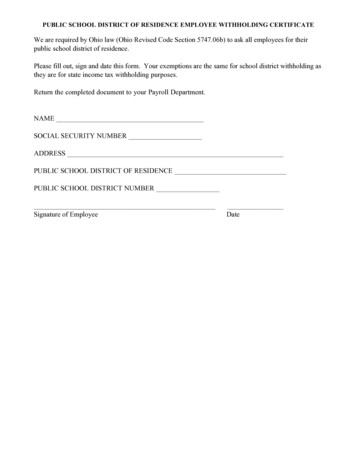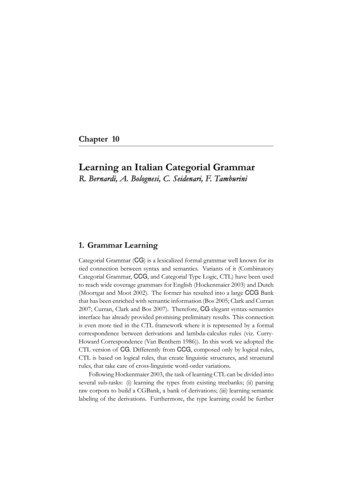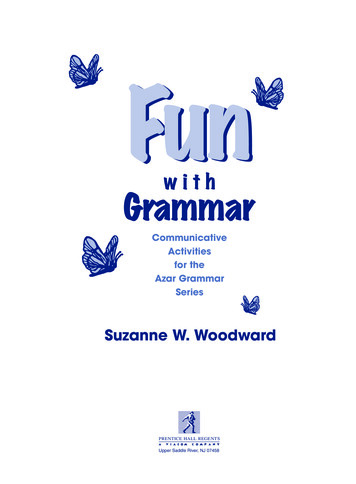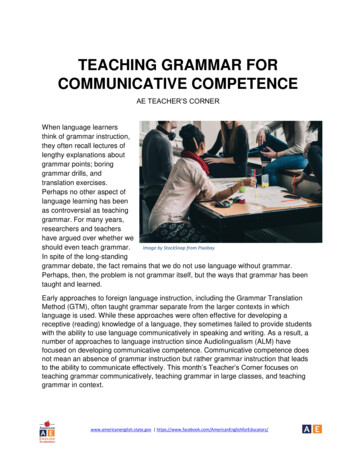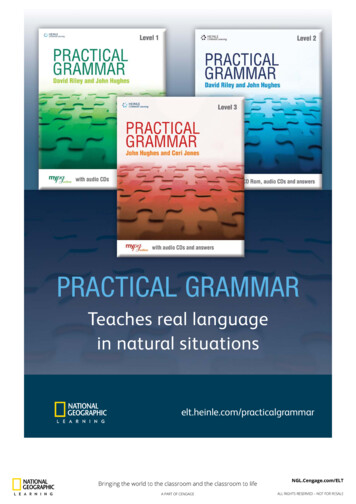
Transcription
goof-proofGRAMMAR
goofoofrp-GRAMMARFelice Primeau DevineNE WYO R K
Copyright 2002 Learning Express, LLC.All rights reserved under International and Pan-American CopyrightConventions.Published in the United States by Learning Express, LLC, New York.Library of Congress Cataloging-in-Publication Data:Devine, Felice Primeau.Goof-Proof grammar / Felice Primeau Devine.—1st ed.p. cm.Includes bibliographical references.ISBN 1-57685-427-2 (alk. paper)1. English language—Grammar—Handbooks, manuals, etc. I. Title.PE1112 .D46 2002428.2—dc212002009468Printed in the United States of America9 8 7 6 5 4 3 2First EditionISBN 1-57685-427-2For more information or to place an order, contact Learning Express at:55 Broadway8th FloorNew York, NY 10006Or visit us at:www.learnatest.com
ABOUT THE AUTHORFelice Primeau Devine is a writer from Albany, New York. Shehas worked in publishing for more than ten years as an editor,publicist, and brand director. She is also the author of Goof-ProofSpelling, U.S. Citizenship: A Step-by-Step Guide, and PharmacyTechnician Career Starter. Ms. Devine is also the coauthor ofCosmetology Career Starter.
CONTENTSIntroductionPretestSECTION ONE:HOW TO IMPROVE YOUR GRAMMARLearn the Goof-Proof RulesUse Flash CardsRead!Visit Helpful Grammar Websites(with list of sites)SECTION TWO:THE GOOF-PROOF RULES—BASIC BLUNDERS#1#2#3#4Avoiding Sentence Fragments and Run-OnsOverusing and Abusing CommasUsing Semicolons and ColonsOverdosing on Dashesxixv1122256101417
viiig o o f - p ro o fGRAMMAR#5 Subjects and Verbs that Don’t Agree#6 Active vs. Passive Voice:Passing Up Activity for Passivity#7 Going Crazy with Capitalization#8 Confusing Comparatives and Superlatives#9 Double Negatives: Being Too Negative!#10 Mistaking Adjectives for AdverbsSECTION THREE:THE GOOF-PROOF RULES—WORD gUsingA or AnAccept and ExceptAffect and EffectAmount and NumberAnxious and EagerBetween and AmongBring and TakeCan and MayCapital, Capitol, or CapitolComplement or ComplimentContinual or ContinuousEach Other or One AnotherEminent or ImminentFarther or FurtherFeel Bad or Feel BadlyFewer or LessFormally or FormerlyGood or WellInsure, Ensure, or AssureImply or 758596061
ingUsingUsingUsingUsingUsingUsingUsingIts or It’sLay or LieMe, Myself, or IPer or A/AnPrinciple or PrincipalStationary or StationeryThan or ThenThat or WhichWeather or WhetherWho or Whom62636668707172747677SECTION FOUR: RESOURCES79Quick Reference ChartsBusiness Letter BasicsList of Grammar Resources799192Answer Key95ix
INTRODUCTIONMany peoplethink that grammar is no longerimportant. This is, after all, the age of e-mail and instant messaging, slang, and rap music. Emoticons, rhymes, lingo, and shortcutsare more common in the world of fast-paced communication thansubject-verb agreement and the proper use of the word myself.Grammar rules appear antiquated, irrelevant, or overly scholarly.Not so!Good grammar is back with Goof-Proof Grammar. In fact, goodgrammar rules have actually stayed in vogue in today’s businessworld, even at the dotcoms. Don’t let anyone lead you to believeotherwise. Like spelling, grammar always counts!In this book, you will learn that the pursuit of proper grammaris not over when you hand in your final English paper. Understanding grammar and following the rules can and will impactyour day-to-day life in a positive way. Choosing the correct wordsto use in your correspondence and speech will help you to convey your message more easily and clearly. Good grammar caneven get you promoted!If you are like most people, however, you may believe that perfecting your grammar is beyond your abilities. Luckily, you do not
xiig o o f - p ro o fGRAMMARneed to become a strict grammarian in order to speak and writewell. A few dozen grammatical gaffes account for the majority ofall errors. If you learn the common errors and how to correct andavoid them, you will be on your way toward improved writingand speaking. That is what this book will help you do.Goof-Proof Grammar covers the most common and egregiouserrors. They are debunked in mini-lessons with Goof-Proof Rulesthat explain the typical error, and how to prevent it. You will beshown easy ways to right writing wrongs—to quickly enhanceyour grammar.The book is divided into four sections, each with a differentgrammar goal: Section One: How to Improve Your Grammar, explains thetechniques that you will want to employ in order to get themost out of the book. Section Two: Basic Blunders, is the first of two sections containing the Goof-Proof Rules. This section covers some of themost frequent sentence-writing mistakes. Section Three: Word Usage, contains 30 Goof-Proof Rules forcorrecting the most common word usage errors. Section Four: Resources, provides websites, books, videos,and other handy information for you to use to further improveyour grammar.After reading this book and mastering the Goof-Proof Rules,you will be able to point out the mistakes in sentences such asthese:1. When you go to the marketing meeting, bring the revisedoperating review.2. Susan invited Gloria and myself to the surprise party.3. We could of gone to the hockey game last night.4. Our new car, however is a convertible.(See the Answer Key on page 95 for the answers.)
i n t ro d u c t i o nReady to goof-proof your grammar? Then let’s get started. Thefirst order of business is the pretest, to find out where yourgrammar strengths and weaknesses lie. Then, it’s on to goofproofing your goof-ups!xiii
PRETESTThis pretestis designed to show you the areaswhere most of your grammar goof-ups occur. After you completethe pretest, check your answers in the Answer Key on page 95.For each incorrect answer, turn to the appropriate section of thebook to learn how to Goof-Proof yourself for the future.Choose the correct word to complete each sentence.1. Ronald and Emily going on a date on Friday.a. isb. arec. willd. be
xvig o o f - p ro o fGRAMMAR2. When you are finished with dinner, give your plate to .a. meb. myselfc. Id. mine3. The company manufactures the new computer chipswon a large federal contract last month.a. whichb. that4. Javier performed in his first concert of the season.a. goodb. goodlyc. well5. Lucy is the girl in Great Lakes Middle School.a. olderb. most olderc. oldest6. Did flight arrive on time?a. theirb. therec. they’re7. Chloe and her best friend to go to the mall.a. wantsb. want
p re t e s t8. She doesn’t mind the cold because she grew up in astate.a. northernb. Northern9. Kara and Kevin are the annual awards dinner.a. to organizeb. organizec. organizingd. organized10. Glenn working overtime for the last three weeks.a. wasb. isc. has beend. be11. The buckle on my favorite belt .a. brokedb. breakc. brokend. broke12. Neither the CEO nor the trustees the outcome of thevote.a. knowb. to knowc. have knownd. are knowingxvii
xviiig o o f - p ro o fGRAMMARCircle the word that best completes the following sentences.13. Kristen has a difficult time accepting compliments /complements.14. My new living arrangement works very good / well.15. There are less / fewer people exercising at the gym now thatthe weather is so nice.16. If you are tired, you should lie / lay down and take a nap.17. Don’t forget to include all of the boys and myself / me whenyou make your attendance list.18. Its / It’s been a year since we went on our last vacation.19. Omar is the one that / who told me about this movietheater.20. We have many different kinds of soda / sodas for yourenjoyment.21. Kimberly is the younger / youngest of the twins.22. The decorator chose the more / most unusual color schemeI’ve ever seen.Determine if the following sentences are correct or incorrect.23. I find shopping at the grocery store quite tedious.24. The carpet has been vacuumed by Claire.
p re t e s t25. Enrique went to the concert with Michelle.26. There house is across the bridge from the park.27. The roller coaster ride was exhilarating for myself.28. Her new bracelets was a beautiful color.29. James was the most handsome of her two brothers.30. We were worried that she is going to elope.31. When they went to Washington, they visited the Capital.32. She didn’t want no apple pie.33. Henry is the most best piano player I have ever seen.34. The notice said that a decision was imminent.35. The secret was just among the two best friends.36. Maria was formerly a ballerina.37. The cat, slept during the day and ran around all night.38. Will be back in an hour.xix
goof-proofGRAMMAR
sectionONEHOW TO IMPROVEYOUR GRAMMAREmploying a few simple strategies will shorten theamount of time it will take you to goof-proof your grammar.Think about these strategies as important steps in your overallgrammar improvement plan. LEARN THE GOOF-PROOF RULES Of course you need to learn the Goof-Proof Rules. This does notmean that you can read through the rules and expect to seeimmediate improvement. You need to learn the Goof-Proof Rules.There is a difference.Learning the Goof-Proof Rules will involve taking the quizzesthat accompany the rules, and using the techniques outlined inthis section. When you begin to learn the Goof-Proof Rules, youmay want to target one or two rules to learn each week. Then,during the week, you can focus your attention on those rules,applying them to your everyday life. Dedicate yourself to learning the rules and you will be goof-free in no time!
2g o o f - p ro o fGRAMMAR USE FLASH CARDS You might feel silly using flash cards, but once you notice thatyou are no longer making careless grammar mistakes, chancesare, you won’t mind being a bit silly. Flash cards are easy andconvenient to use. All you need is a pack of index cards and apen. Here are some ways in which you can use flash cards toyour advantage: On the front of each card, write a word you want to learn touse properly. Write the complete word definition on the back.Quiz yourself by trying to correctly define the word.Write a Goof-Proof Rule on the front, and examples of the ruleon the back. READ! In Section IV, you will find a list of books that may be helpfulresources for further improving your grammar. In addition toreviewing those books, try reading more in general. By readingmore, you will increase your familiarity with proper grammar.This familiarity, in turn, will increase your comfort level with usingyour new grammar knowledge.You do not have to choose scholarly works to benefit fromreading. Pick up a newspaper, magazine, trade journal, or anything else that appeals to you. Set aside some time everyday toread. Make the choice to read more and then do it! You will seegrammar in action, notice words being used correctly (and youmay begin to notice when they are being used improperly, aswell), and expand your vocabulary. VISIT HELPFUL GRAMMAR WEBSITES These websites contain information that may help you to improveyour writing. You will notice that several of these sites weredesigned for ESL (English as a Second Language) programs. These
h o w t o i m p ro v e y o u r g r a m m a rprograms often offer clear, easy-to-understand explanations of thecomplexities of English grammar. Some sites that you may consider visiting are:www.dictionary.com—A useful online dictionary.www.m-w.com—Merriam Webster Online. This site has a number ofinteresting features that will make you forget you are trying toimprove your spelling! Check out the Word for the Wise section(www.m-w.com/wftw/wftw.htm) for fun facts about words.www.randomhouse.com/words/—Words@Random. Here you willfind crossword puzzles, quizzes, dictionaries, and other fun stuff allin one site.www.wsu.edu/ brians/errors/index.html—Paul Brians’ “CommonErrors in English” g and -study quizzes for ESL students, butuseful for anyone interested in .html—University ofOregon, Yamada Language Center Website.www.protrainco.com/info/grammar.htm—The Professional TrainingCompany’s “Good Grammar, Good Style Pages.”www.englishgrammar101.com—English Grammar 101. Several English grammar tutorials.www.dailygrammar.com—Daily Grammar. This site offers daily email messages with a grammar lesson five days of the week and aquiz on the sixth day. http://ccc.commnet.edu/grammar/—Guide toGrammar and Writing.http://jcomm.uoregon.edu/ russial/grammar/grambo.html—A Test of the Emergency Grammar System.3
sectionTWOTHE GOOF-PROOF RULES—BASIC BLUNDERS
6g o o f - p ro o fGRAMMARTHE GOOF-UPRULE #1: Avoiding Sentence Fragmentsand Run-OnsGOOF-PROOF!A sentence expresses a complete thought. Neither a dependentclause on its own, nor a series of independent clauses run togetheras one, make a correct sentence.In order to express a complete thought, a sentence is comprisedof a subject and a predicate. The subject is the part of the sentence that tells what the sentence is about. It can be one or morewords. The predicate is the part of the sentence that explainssomething about the subject. It also can be one or more words.Here are some examples of simple sentences:I was typing. (Subject: I. Predicate: was typing.)He is mowing the lawn. (Subject: he. Predicate: is mowing thelawn.)Sentences are made more complex by independent anddependent clauses. Clauses are groups of words that have a subject and a predicate. An independent clause expresses a completethought and can stand alone. The previous example of two simple sentences showed independent clauses. When two or moreindependent clauses are joined in one sentence, it becomes acompound sentence.Here are two examples of compound sentences formed byindependent clauses:I was typing, but I was thinking about what to have for lunch.He is mowing the lawn, while I am trimming the hedges.
t h e g o o f - p ro o f r u l e s — b a s i c b l u n d e r sDependent clauses, on the other hand, cannot stand alone.They are groups of words that have a subject and a predicate butdo not express a complete thought. For example:When I was typingBecause I am trimming the hedgesEach clause leaves you needing more information. Thesedependent clauses can become part of a complete sentence whenyou add an independent clause to them. For example:When I was typing, I was thinking about what to have forlunch.He is mowing the lawn, and I am trimming the hedges. Fragments and Run-onsA sentence fragment is a group of words that, although punctuated as a sentence, does not express a complete thought. A fragment may be a dependent clause passed off as a sentence.Fragments also can be phrases or parts of other sentences. Hereare some sentence fragments:At the zoo.Cried a lot.Can’t go to the store.When we finished the game.A run-on sentence is a group of independent clauses that arerun together into one sentence without proper punctuation. Hereare some examples of run-on sentences:We were hungry and John was tired so we had to stop at thefirst rest area that we saw.7
8g o o f - p ro o fGRAMMARPatty took flying lessons every Saturday so she couldn’t go tothe picnic and she couldn’t go to the graduation party eitherbut she has already signed up for another group of flying lessons because she likes it so much.[ QUIZ ]Choose the answer choice that does not express a correct,complete sentence. Turn to the Answer Key to see how youperformed.1. a. We urged her to run for town supervisor.b. He did not believe the story we told him.c. The car pulling out of the garage.d. no mistakes2. a. They’re planning to drive to Pennsylvania today.b. When will you teach me to play the clarinet?c. I’m afraid of dogs Peter is too.d. no mistakes3. a. I’m taking a class in Canadian literature.b. The children in the park, including all of the girls on theswings.c. George likes my apple pie better than Susan’s.d. no mistakes4. a. Sandra Day O’Connor was the first woman to serve onthe U.S. Supreme Court.b. The trophies were given to Julia and me.c. I saw Dr. Sultana because Dr. Das was on vacation.d. no mistakes
t h e g o o f - p ro o f r u l e s — b a s i c b l u n d e r s5. a. Where are my flip-flops?b. The fiddlehead ferns cost more than the asparagus does.c. Turn off the television it’s time for dinner!d. no mistakes6. a. Baseball is the national pastime of the United States.b. Ernest Hemingway won a Nobel Prize for Literature.c. The rest of the story.d. no mistakes7. a. The sky was a brilliant blue this morning.b. John is an avid stamp collector.c. Frank Sinatra was a member of the “Rat Pack.”d. No mistakes8. a. If you see a Grizzly Bear, do not make any suddenmovements.b. The partygoers, we went too.c. Julio Iglesias is my mom’s favorite singer.d. no mistakes9
10g o o f - p ro o fGRAMMARTHE GOOF-UPRULE #2: Overusing and Abusing CommasGOOF-PROOF!Commas are used to separate different parts of sentences. Here arethe five basic rules for using commas:1.2.3.4.5.To set off nonessential clausesTo set off sentence interruptersTo separate joined sentencesTo set apart a series of words being presented as a groupTo set off introductory sentence partsLet’s look at each rule individually:1. Use a comma to set off nonessential clauses.A nonessential clause is one that can be removed from a sentence without changing the sentence’s meaning. For example:Denise’s boyfriend, who is active in a local theater group, is amanager at the coffee shop.If you remove the highlighted clause from the sentence, thebasic meaning remains the same. This is because the clause isnonessential. See how the basic meaning is the same without thenonessential clause:Denise’s boyfriend is a manager at the coffee shop.
t h e g o o f - p ro o f r u l e s — b a s i c b l u n d e r s2. Use a comma to set off sentence interrupters.A sentence interrupter is a sort of nonessential clause. It can beremoved from the sentence without changing the basic meaning.For example:Timothy, however, will attend a community college in the fall.Take out the highlighted interrupter and the basic meaningstays the same:Timothy will attend a community college in the fall.Some examples of sentence interrupters are:additionallyas a ruleconsequentlyfor examplehopefullyhoweverif possiblein additionin any eventin conclusionin summaryon the contraryon the other handtherefore11
12g o o f - p ro o fGRAMMAR3. Use a comma to separate joined sentences.When you have two complete sentences combined into one bythe use of and, but, or or you should put a comma in front of theand, but, or or.We went to the concert, and we had a great time.Peter missed his family, but he was determined to stay atschool through the end of the semester.You can have chocolate ice cream, or you can have a dish ofvanilla pudding.4. Use a comma to set apart a series of wordsbeing presented as a group.This is known as the serial comma. It is used when you have aseries of words and the last word is preceded by and. Each wordin a series should be separated by a comma. For example:I traveled to Europe with Ryan, Michelle, Brooke, Irwin, andLucille.We visited England, France, Spain, and Italy.5. Use a comma to set offintroductory sentence parts.An introductory sentence part can be a word, a phrase, or aclause. A comma is used to separate the introductory part fromthe main part of the sentence in order to clarify meaning. Here areexamples of introductory words, phrases, and clauses:Exhausted, I climbed into bed.Hoping for the best, we started our climb up the mountain.Although it was a cloudy day, I applied sunblock to all exposedskin.
t h e g o o f - p ro o f r u l e s — b a s i c b l u n d e r s[ QUIZ ]Add commas to correct the following sentences.1. James who is quite shy has become one of my best friends.2. Ecstatic the winner hugged her coach.3. As far as I know that room is empty.4. Phoebe my cousin twice-removed is going to Hawaii inAugust.5. Concerned about her health Jessica made an appointmentto see her doctor.6. Since we hired a new office manager our workload haseased.7. Senator Clinton from Chappaqua was the keynote speaker.8. I am friends with the Chester twins and I am friends withLeslie.9. After running we stretched for ten minutes.10. Those shoes are available in black tan red and white.13
14g o o f - p ro o fGRAMMARTHE GOOF-UPRULE #3: Using Semicolons and ColonsGOOF-PROOF!Semicolons are used to separate independent clauses, and to separate items in a series that contain commas. Colons are used tointroduce and to show relationship.Those are the basic reasons to use semicolons and colons. Let’sexpand on each a little more.Using Semicolons to Separate IndependentClausesCase:Use a semicolon to separate independent clauses joinedwithout a conjunction.Example: Four people worked on the project; only one receivedcredit for it.Case:Use a semicolon to separate independent clauses thatcontain commas, even if the clauses are joined by a conjunction.Example: The strays were malnourished, dirty, and ill; but Liz had aweakness for kittens, so she adopted them all.Case:Use a semicolon to separate independent clauses that areconnected with a conjunctive adverb that expresses arelationship between clauses.Example: Victoria was insubordinate; therefore, she was fired.
t h e g o o f - p ro o f r u l e s — b a s i c b l u n d e r sUsing Semicolons to Separate Items in a Seriesthat Contain CommasThis use helps readers to understand which sets of items gotogether. For example:The dates for our meetings are Monday, January 10; Tuesday,April 14; Monday, July 7; and Tuesday, October 11.She has lived in Omaha, Nebraska; Nutley, New Jersey;Amherst, Massachusetts; and Pensacola, Florida.Using Colons to IntroduceCase:Use a colon to introduce a list of items.Example: These people will ride on the first bus: April, Julie, Kristy,Bradley, Glenn, and Kyle.Case:Use a colon to introduce a formal quotation.Example: My favorite saying is one from Yogi Berra: “90% of thegame is half mental.”Case:Use a colon to introduce a word, phrase, or clause thatadds emphasis to the main part of the sentence.Example: Her weight loss was the result of one thing: a healthydiet.Using Colons to Show RelationshipCase:Use a colon between two independent clauses when thesecond explains the first.Example: Hugh ignored the telephone: He was afraid it was his exgirlfriend.Case:Use a colon between the title and subtitle of a book.Example: Style: A Modern GuideCase:Use a colon between volumes and page numbers.Example: American Authors IV: 45315
16g o o f - p ro o fGRAMMARCase:Use a colon between chapters and verses.Example: Exodus 1:1Case:Use a colon between hours, minutes, and seconds.Example: 12:001:23:31[ QUIZ ]Correct the punctuation in the following sentences, if necessary.1. Aaron was one of the most popular boys therefore, he hadseveral invitations to the prom.2. There are four girls on the relay team Sarah; Denise; Juanita;and Helen.3. We have three choices for vacation destinations MiamiFlorida, Boulder Colorado, and Tempe Arizona.4. She learned to use the new program by reading MicrosoftProject 2000, Step-by-Step.5. Her goal was to finish the race in 1:12:30.6. One activity helped me to increase my vocabulary; readingmore.7. The book’s title was Congers; New York, The Home ofChampions.8. I went to the library on my lunch breaks; Harvey nevertook a lunch break.9. When writing poetry, I always try to remember a quote byThomas Carlyle: “Be not a slave of words.”10. Agnes liked to eat prunes Francois hated them.
t h e g o o f - p ro o f r u l e s — b a s i c b l u n d e r sTHE GOOF-UPRULE #4: Overdosing on DashesGOOF-PROOFDashes do not exist as substitute commas, colons, or semicolons.Rather, dashes are punctuation marks that should be used only fora few specific situations. The four circumstances that requiredashes are: To signify an interruption of thought, or to insert a commentTo emphasize expositionTo represent omitted letters in a wordTo connect a beginning phrase to the rest of a sentenceHere are some examples of the four situations that call for dashes.To signify an interruption of thought, or to insert a comment:I remember exactly where I was and what I was doing—whatAmerican wouldn’t—when the World Trade Center wasattacked.If you drive faster than the speed limit—and these days, manypeople do—you risk receiving a traffic ticket.To emphasize exposition:Keeping a list of your daily food intake—meals, snacks, andbeverages—is a helpful way to track where most of your calories are coming from.Ilsa cracked her knuckles—a nervous habit she’d had sincechildhood—every time her supervisor asked her a question.17
18g o o f - p ro o fGRAMMARTo represent omitted letters in a word:The package was delivered to Ms. D—.Do censors still block the word s— from use on the radio?To connect a beginning phrase to the rest of a sentence:Pride of New York—that is the agriculture program in which Iam interested.Timothy and Brenda—never have I met a more perfect couple![ QUIZ ]Correct the punctuation in the following sentences, if necessary.1. Tenacity and charm that’s what you need to be a goodfundraiser.2. Good time-management skills—planning, prioritizing, andfollowing-through—are essential for managers.3. The girls were scared as was their father when their motherfell down the stairs.4. If you go to the store—please buy a gallon of milk.5. If I ever see L—again, I will give her a piece of my mind.
t h e g o o f - p ro o f r u l e s — b a s i c b l u n d e r sTHE GOOF-UPRULE #5: Subjects and Verbs that Don’t AgreeGOOF-PROOF!Verbs should agree with their subjects. This means that a singularsubject requires a singular verb; a plural subject requires a pluralverb. The key here is to identify the subject of the sentence, determine whether it is singular or plural, and then choose a correctverb.We will start by looking at subjects.One of the children is visiting today.In this sentence, the subject is one, not children. Children ispart of the prepositional phrase (of the children), and subjectsare never found in prepositional phrases. So, the subject issingular, and the verb must be singular (is, not are) to agree withone.Luke and Pedro are on the baseball team.In this sentence, the subject is Luke and Pedro. The subject isplural, so the verb (are) must be plural, as well.Here are some examples of incorrect and correct subject-verbagreement:Incorrect: Saundra always do well on exams. (singular subject(Saundra), plural verb (do))Correct: Saundra always does well on exams. (singular subject(Saundra), singular verb (does))Incorrect: Marc and Leslie is going to the park. (plural subject (Marcand Leslie), singular verb (is))Correct: Marc and Leslie are going to the park. (plural subject(Marc and Leslie), plural verb (are))19
20g o o f - p ro o fGRAMMARWhen sentences become more complex, you will need to lookcloser to determine how to make the subject and verb agree. Hereare some guidelines that may help you: If a compound, singular subject is connected by and, the verbmust be plural.Both the 10-speed and the hybrid are appropriate for the bikerace. If a compound, singular subject connected by or or nor, theverb must be singular.Neither the 10-speed nor the hybrid is appropriate for a trailrace, however. If one plural and one singular subject are connected by or ornor, the verb agrees with the closest subject.Neither a fast bike nor perfect trails are going to help you towin if you do not train.Neither sore muscles nor a rainy day is going to stop me fromtaking part in the race. When the subject comes after the verb, subject-verb agreement can be tricky. In sentences that begin with there is andthere are, for example, the subject comes after the verb. Theverb (is/are) must agree with that subject. For example:Incorrect: There’s many reasons to exercise.Correct: There are many reasons to exercise.Incorrect: Here’s the statistics to prove it.Correct: Here are the statistics to prove it.[ QUIZ ]Correct the following sentences, if necessary.1. My cousin and his wife is coming to visit.2. Neither those memos nor this proposal were clearly written.3. Both of my friends are going to France in September.
t h e g o o f - p ro o f r u l e s — b a s i c b l u n d e r s4. One of the bridesmaids was pregnant at the wedding.5. Either Patty or Ann are going to be laid off next week.6. There is no truth to the gossip.7. She are looking for a pair shoes at the mall.8. I don’t think there’s a need to further elaborate on thissubject.9. Jiang were the best dressed at the party.10. Diane and I are going on a date tonight!21
22g o o f - p ro o fGRAMMARTHE GOOF-UPRULE #6: Passing Up Activity for PassivityGOOF-PROOF!You should always strive to write in the active, rather than passive,voice. Try to include action words in your sentences and have thesubject do something, not have something done to it.Writing in the active voice is clearer and more direct. It helps youto convey your meaning more easily. If you use the passive voice,however, your sentences may become too wordy. Wordy sentences often lack focus, causing your readers to have a tough timeidentifying your point. Active VoiceWhen you write in the active voice, the subject of the sentencecauses, or is the source of, the action. For example:The gentleman asked for another glass of wine.I misplaced my wallet.The human resources team has selected three finalists for theopen position.In each sentence, the subject is the source of the action. Thesentences are clear, and you can understand what the action isand where it is coming from.
t h e g o o f - p ro o f r u l e s — b a s i c b l u n d e r s Passive VoiceIn contrast to the active voice, when you write in the passivevo
and speaking. That is what this book will help you do. Goof-Proof Grammar covers the most common and egregious errors. They are debunked in mini-lessons with Goof-Proof Rules that explain the typical error, and how to prevent it. You will be shown easy ways to right writing wrongs—to quickly enhance your grammar
